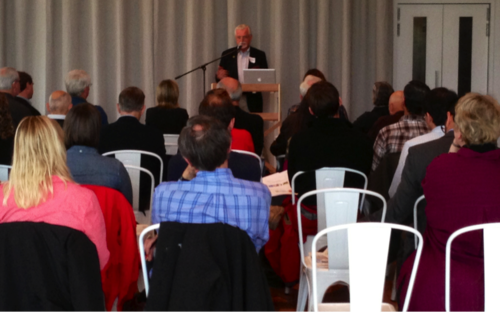
The article “Climate change will threaten wine production, study shows” reports that traditional wine growing areas will find it more difficult to grow wine grapes over the next forty years, and that production will shift to other regions.
In response, fifty Sonoma County wine industry leaders recently met in Healdsburg to learn about Sonoma Clean Power, an initiative that would make significantly more clean power available to businesses and residents.
Assemblymember Wes Chesbro opened by describing state laws and efforts to support community power initiatives. Such initiatives align with the State’s goal to increase the amount of “distributed generation.” This means producing more power closer to where it is used rather producing it at distant, large, centralized locations, Chesbro explained.
Damon Connolly, Chair of Marin Energy Authority, a successful community power program, told the group that they are currently serving over 90,000 customers in every city in Marin, that their power mix is 50% green compare to PG&E at 20% and that their rates are competitive with PG&E’s.
John Nagle, Environmental Manager for E J Gallo and a member of the Sonoma Clean Power Steering Committee, described the basic concept of community power as well as the status of the process. He said that this public-private partnership will bring competition into the electricity market and invest money in local renewable energy development. This in turn will stimulate the economy and create jobs.
Brian Hemphill, Director of Operations at Clos du Bois Winery, spoke about opportunities Sonoma Clean Power will offer to the wine industry if designed correctly. Brian emphasized that rates must be competitive with PG&E’s. He also recommended that the program include incentives for businesses to invest in energy efficiency and renewable energy, and to produce more power than needed with the ability to sell the surplus to Sonoma Clean Power. This could turn the roof space or parking lots of wineries into revenue generating assets. Clos du Bois currently has over a megawatt of installed solar,
The meeting closed with a request from Natasha Granoff, Business Development Director for Sonoma Wine Company, that attendees sign a business letter supporting program design elements that Brian highlighted. Natasha also encouraged people to attend the Board of Supervisors meeting on April 23 where the proposals from private electric service providers for Sonoma Clean Power will be discussed, and preliminary estimated rates for the new service will be announced.

